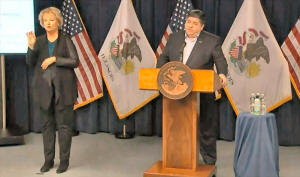UPDATED: Leaders optimistic with Moderna vaccine on horizon
 Send a link to a friend
Send a link to a friend
[December 19, 2020]
By SARAH MANSUR
Capitol News Illinois
smansur@capitolnewsillinois.com
SPRINGFIELD – Gov. JB Pritzker announced
Friday that more than 17,000 doses of the first coronavirus vaccine have
been administered to Illinois frontline health care workers outside of
Chicago, up from 3,500 doses on Thursday.
Pritzker said Illinois hospitals could begin to receive shipments of a
second COVID-19 vaccine, developed by the drug company Moderna, as early
as next week. That announcement comes one day after the U.S. Food and
Drug Administration’s advisory committee recommended the use of the
Moderna vaccine in people ages 18 and older. The FDA on Friday evening
granted Emergency Use Authorization for the Moderna vaccine.
The first vaccine, developed by Pfizer and BioNTech, received such
authorization from the FDA last week.
The Moderna vaccine was shown to be 94.1 percent effective after two
doses four week apart, compared to the Pfizer BioNTech vaccine that was
found 95 percent effective after two doses three weeks apart.

“This is yet another very exciting development, and it reinforces and it
brightens the light at the end of the tunnel for all of us who have been
fighting through COVID-19,” Pritzker said.
News about the vaccines comes as the state’s coronavirus death toll
surpassed 15,000, rising to 15,015 among 886,805 cases and more than 12
million test results reported since the beginning of the pandemic.
On Friday, the Illinois Department of Public Health reported 7,377 new
confirmed and probable cases of COVID-19 in Illinois, including 181
additional deaths.
Statewide, the rolling seven-day average case positivity rate was 8
percent, which decreased four-tenths of a percentage point from the day
prior. This is the fifth straight day that the rolling seven-day average
case positivity rate has decreased, and it’s the lowest rate recorded
since Nov. 1.
At the end of Thursday, there were 4,690 people hospitalized with
COVID-19 in Illinois, a decrease of 114 from the day prior.
Approximately 25 percent of hospital beds remained open statewide.
There were 1,023 intensive care beds in use by COVID-19 patients as of
Thursday night, a decrease of 40 from the day prior. That left 20
percent of ICU beds open statewide.
COVID-19 patients occupied 589 ventilators, an increase of 14 from the
day prior, leaving 72 percent of ventilators available statewide.
Two of the state’s 11 mitigation regions — Region 1, which encompasses
the northern and western portion of the state, and Region 6, which
covers portions of eastern and central Illinois — have met the
conditions laid out by the Pritzker administration to return to Tier 2
mitigations, from Tier 3, which all 11 regions entered by Nov. 20. But
the governor said that does not mean existing regulations will be rolled
back in the near future.
Both Region 1 and Region 6 have experienced a test positivity rate less
than 12 percent for three consecutive days, had greater than 20 percent
available intensive care unit and medical or surgical bed availability
for three consecutive days, and saw a decline in the number of COVID-19
patients in the hospital in 7 out of the last 10 days.
Tier 3 mitigations strictly limit capacity at retail stores and other
Illinois businesses and require casinos and video gambling terminals to
close, among other economic restrictions, which would no longer apply in
Tier 2. However, Tier 2 mitigations still prohibit indoor dining at
restaurants or bars.
[to top of second column]
|

Gov. JB Pritzker takes questions at his daily
COVID-19 briefing in Chicago on Friday, Dec. 18. (Credit:
Blueroomstream.com)

“First of all we're very glad that things are moving in the right
direction. We're also concerned the numbers have not come down as
precipitously as we would have liked to have seen by now. And so
that's of great concern to us. We're still seeing 7,000, 8,000,
9,000 cases every day, and we still have a positivity rate that's
far from the (World Health Organization) recommended 5 percent,”
Pritzker said in response to a question about the regions that met
criteria to return to Tier 2.
Despite the regions meeting the criteria, Pritzker has said no
regions will be removed from stricter mitigations at this time, and
it is unclear when the rollback of mitigations may begin.
“Since the surge hit us, it's been important for us to get the right
trajectory of cases, and hospitalizations and ICU use, and to make
sure that we get to the right level. Remember, there are still many
hospitals around the state, that have limited ability to take in new
ICU patients, or even new hospitalizations. And so we're trying very
hard to bring it down all across the state before we start to
relieve the regions from Tier 3 to Tier 2.”
IDPH Director Dr. Ngozi Ezike was asked about whether the
anticipated increase in COVID-19 cases and hospitalizations that was
expected after the Thanksgiving holiday, due to greater numbers of
people traveling and gathering, has been avoided since that spike
has not yet occurred.

“I am really happy to say that we did not see the significant surge
that we were very much concerned about in relation to all the
reports that we saw of the large amount of travel here in the state
of Illinois,” Ezike said. “I think all the mitigations that we had
in place in advance of Thanksgiving have been helpful. So, no we did
not see a surge following Thanksgiving. I'm waiting for this final
week's tally, which will come on Monday, but so far that is a good
thing that we can report.”
Pritzker also announced that after Friday’s news briefing, his
administration will hold news conferences on “an as needed basis”
instead of daily.
“I can promise that you'll still be hearing from Dr. Ezike and me
often as we provide regular updates on vaccine distribution, the
status of our regions in the Restore Illinois plan and general
statewide COVID-19 trends,” Pritzker said.
Capitol News Illinois is a nonprofit, nonpartisan
news service covering state government and distributed to more than
400 newspapers statewide. It is funded primarily by the Illinois
Press Foundation and the Robert R. McCormick Foundation.
[© 2020 Thomson Reuters. All rights
reserved.] Copyright 2020 Reuters. All rights reserved. This material may not be published,
broadcast, rewritten or redistributed.
Thompson Reuters is solely responsible for this content. |